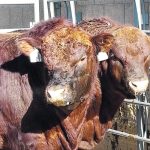Expected progeny differences come with a wide range of numbers, while indexes simplify many factors into one number
Every breed has its own indexes, and they work in similar ways. The important ones in the Canadian Hereford Association, for instance, are the Maternal Productivity Index (MPI) and the Feedlot Merit Index (FMI). The MPI for the Canadian Hereford Association, which was created in 2000 by Agriculture Canada, was designed to combine genetic factors […] Read moreTag Archives Cattle Connect — page 5

Portable corrals ease handling stress
Facilities can be set up anywhere, even in the middle of a large pasture, but it’s important to handle the cattle properly
Portable corrals can make handling easier when cattle are in large pastures. Dr. Kip Lukasiewicz of Sandhills Cattle Consultants says his early experience with portable corrals occurred when he was in a cow-calf practice at Ainsworth, Nebraska. “We did a lot of pregnancy checking, Bangs vaccinations, etc. with more than 45,000 cows in that practice. […] Read more
Horned cattle may require special chutes
Horns are an asset in the Longhorn, Watusi and Scotch Highlander breeds, but safe handling methods must be found
The handling of horned cattle requires special considerations. Longhorn, Watusi and Scotch Highlander breeds, as well as yaks, can have horns that aren’t easily accommodated in regular cattle chutes. Thus, there are specially designed chutes that are safer for the animals and the people handling them. They include simple panels with horizontal bars so the […] Read more
Handling and sorting can be easy, with or without a corral
Patience, an ability to read cattle and knowing the pastures and terrain can make all the difference when handling cattle
Cattle respond to good handling by becoming easy to manage. If mishandled, they react with suspicion or fear when they see people and become difficult to handle. Consistent, non-confrontational methods can build trust in a herd. Al Fenton of Fenton Herefords near Irma, Alta., has been raising Herefords for decades and has 700 registered cows, […] Read more
Breeder urges producers to reap benefits of hybrid vigour
Montana producer says Charolais has the most potential for crossing because many other European breeds have changed
Crossbred cattle have several advantages over purebreds, especially fertility, longevity, feed efficiency and disease resistance. Buddy Westphal, a Charolais breeder near Polson, Montana, says he is amazed that more ranchers haven’t taken advantage of hybrid vigour. “When I was in college 50 years ago, that was the ‘new’ thing that got me into the Charolais […] Read more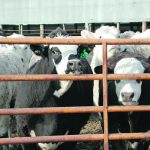
Early weaning an option during drought
Cows and calves can both benefit from the practice in a year when feed sources are limited due to poor growing conditions
Early weaning can be a viable option when pasture and feed supplies are low due to drought, academics and specialists say. Dr. Bart Lardner and Dr. Greg Penner, both with the University of Saskatchewan, say early weaning can reduce cows’ nutrient requirements. If calves can transition through weaning with little stress and effect on appetite, […] Read more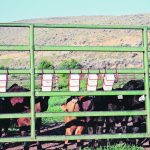
Orphan calves can steal, but intervention better
Some calves can survive by robbing enough milk from other cows, but they may be smaller than their peers at weaning
It’s easy to bottle-feed a newborn calf when necessary but it’s far more challenging to raise an older calf that loses its mother. The calf might be semi-wild but too young to go without milk. Dr. Ray Randall, a veterinarian near Bridger, Montana, says some calves can rob enough milk from other cows, though this […] Read more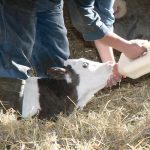
Feeding the orphan with milk plus forage
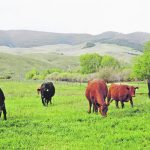
Drought heightens risk of vitamin A deficiency
Most cattle have lower than usual supplies of vitamin A because of the drought, so producers should consider supplements
Cattle are at higher risk of vitamin A deficiency due to last year’s drought and related shortage of green grass. Dr. Cheryl Waldner, Beef Cattle Research Council chair at the Western College of Veterinary Medicine, says cattle with access to green pasture can readily obtain about four months worth of vitamin A, stored in the […] Read more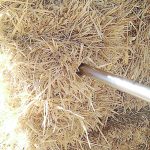
Cow nutrition levels will determine rebreeding success
Nutrients are needed for reproduction, to maintain a pregnancy and grow the fetus as well as basic maintenance needs
Cows must have adequate body condition to cycle and rebreed in a timely manner and that requires enough feed and energy to meet their needs, says a prominent veterinarian. Beyond basic maintenance needs, nutrients are needed for reproduction, to maintain a pregnancy and grow the fetus. Lactation after calving requires the most nutrients. As lactation […] Read more


